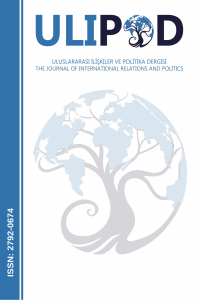Fransa ve Almanya’nın Avrupa Ordusu veya NATO İkilemi
Avrupa Ordusu, Fransa, Almanya, neo-realizm
France and Germany’s European Army or NATO Dilemma
European Army, neo-realism, France, Germany,
___
- BBC (2018, 06 Kasım). “France’s Macron pushes for ‘true European army’”, https://www.bbc.com/news/world-europe-46108633, (Erişim Tarihi: 18.03.2023).
- Buck, T. (2018, 29 Kasım). “Germany plans to increase size of armed forces”, Financial Times, https://www.ft.com/content/5d79501a-f3e5-11e8-ae55-df4bf40f9d0d, (Erişim Tarihi: 18.03.2023).
- Bundestag.de (2019). “Information from the Parliamentary Commissioner for the Armed Forces”, Annual Report 2018 (60th Report), https://www.bundestag.de/resource/blob/594458/e26b85c43f6fe74f387f488961d9c387/annual_report_2018_60th_report-data.pdf, (Erişim Tarihi: 18.03.2023).
- CNN Türk. (2022,, 16 Ekim). “Scholz’dan “Avrupa Ordusu” çağrısı”, https://www.cnnturk.com/video/dunya/scholzdan-avrupa-ordusu-cagrisi, (Erişim Tarihi: 18.11.2022).
- Colby, E. A. ve Mitchell, A. W. (2020, 23 Temmuz).”The Age of Great-Power Competition: How the Trump Administration Refashioned American Strategy”, Foreign Affairs, https://www.foreignaffairs.com/articles/2019-12-10/age-great-power-competition, (Erişim Tarihi: 18.03.2023).
- Cooper, R. (2004).The Breaking of Nations: Order and Chaos in the Twenty-First Century, 1st Printing Editions, Atlantic Monthly Press.
- Deschaux-Dutard, D. (2009). “l’Allemagne et la défense européenne: une locomotive symbolique plus qu’opérationnelle?” Revue Défense Nationale, Cilt: 6, Sayı: 821, ss. 37–42.
- Dockrill, S. (1991). Britain’s Policy for West German Rearmement 1950-1955, Cambridge University Press.
- France Présidence de la République (2008). “The French White Paper on defence and national security”, https://media.nti.org/pdfs/15-Fr.pdf, (Erişim Tarihi: 20.03.2023).
- France Présidence de la République (2013). “The French White Paper on defence and national security”, https://www.defense.gouv.fr/content/download/215253/2394121/file/White%20paper%20on%20defense%20%202013.pdf, (Erişim Tarihi: 20.03.2023).
- Frankfurter Allgeimene (2018, 16 Kasım). “Words must now be followed by deeds”, https://www-faz-net.translate.goog/aktuell/politik/inland/europaeische-armee-von-der-leyen-will-parlamente-staerken-15892744.html?_x_tr_sl=en&_x_tr_tl=tr&_x_tr_hl=tr&_x_tr_pto=sc, (Erişim Tarihi: 20.03.2023).
- Germany Federal Ministry of Defence (2006). “White Paper 2006 on German Security Policy and the Future of the Bundeswehr”, https://www.files.ethz.ch/isn/156941/Germany%202006%20white%20paper.pdf, (Erişim Tarihi: 20.03.2023).
- Germany Federal Ministry of Defence (2016). “White Paper 2016 on German Security Policy and the Future of the Bundeswehr”, https://issat.dcaf.ch/download/111704/2027268/2016%20White%20Paper.pdf, (Erişim Tarihi: 20.03.2023).
- Grand, C. (2011).”The French Case: Livre Blanc sur la Défense et la Sécurité Nationale”, EU-US Security, IAI/UI/FRS/CSIS.
- Helnarska, K. J. (2013). “The National Security of France in White Papers on Defense Continuity or change?”, Polish Political Science, Vol XLII.
- Huntington, S. P. (2009). “The Lonely Superpower,” Foreign Affairs, Cilt: 78, Sayı: 2, ss. 35-49. J.C., (2018, 09 Ağustos). “Why Germany’s army is in a bad state”, The Economist, https://www.economist.com/the-economist-explains/2018/08/09/why-germanys-army-is-in-a-bad-state, (Erişim Tarihi: 20.03.2023).
- Kempin, R.ve Kunz, B. (2017). “France, Germany, and the Quest for European Strategic Autonomy: Franco-German Defence Cooperation in A New Era”, IFRI - Institut Français Des Relations Internationales, https://www.ifri.org/en/publications/notes-de-lifri/notes-cerfa/france-germany-and-quest-european-strategic-autonomy-franco, (Erişim Tarihi: 20.03.2023).
- Lykeke Jr. A. (1989). “Strategy=E+W+M”, Military Review, LXIX. No 5.
- Macdonald, P. K., ve Parent, J. M.(2011). “Graceful Decline? The Surprising Success of Great Power Retrenchment”, International Security, Cilt: 35, Sayı: 4, ss. 7–44.
- Maïa De La B. ve Herszenhor, D. M. (2021, 02 Kasım). “Merkel joins Macron in calling for EU army to complement NATO”, Politico, https://www.politico.eu/article/angela-merkel-emmanuel-macron-eu-army-to-complement-nato/, (Erişim Tarihi: 20.03.2023).
- Mearsheimer, J. J. ve Walt, S. (2023). “An Unnecessary War”, Foreign Policy, Cilt: 134, ss. 51-59.
- Moravcsik, A. (2014, 13 Aralık). “Shaping Europe: France, Germany, and Embedded Bilateralism From the Elysée Treaty to Twenty-First Century Politics”, Foreign Affairs, https://www.foreignaffairs.com/reviews/capsule-review/2014-12-15/shaping-europe-france-germany-and-embedded-bilateralism-elysee, (Erişim Tarihi: 20.03.2023).
- Munich Security Conference.org (2017). “Munich Security Report 2017”, (https://securityconference.org/en/publications/munich-security-report-2017/, (Erişim Tarihi: 20.03.2023).
- NATO (2008, April 03). Bucharest Summit Declaration, https://www.nato.int/cps/en/natolive/official_texts_8443.htm, (Erişim Tarihi: 11.04.2023).
- Rasmussen, A.F. (2010). “The New Strategic Concept: Active Engagement, Modern Defence”, NATO.int, https://www.nato.int/cps/fr/natohq/opinions_66727.htm?selectedLocale=en, (Erişim Tarihi: 20.03.2023).
- Russian Foreign Ministry (2013). The Foreign Policy Concept of the Russian Federation 2013, https://www.voltairenet.org/article202037.html, (Erişim Tarihi: 11.04.2023).
- SIPRI (2019). “Trends in World Military Expenditure, 2018” SIPRI.org, https://www.sipri.org/sites/default/files/2019-04/fs_1904_milex_2018_0.pdf, (Erişim Tarihi: 20.03.2023).
- SIPRI (2021). “World military spending rises to almost $2 trillion in 2020” SIPRI.org, https://www.sipri.org/media/press-release/2021/world-military-spending-rises-almost-2-trillion-2020, (Erişim Tarihi: 20.03.2023).
- The Economist (2019, 07 Kasım). “Emmanuel Macron warns Europe: NATO is becoming brain-dead”, https://www.economist.com/europe/2019/11/07/emmanuel-macron-warns-europe-nato-is-becoming-brain-dead, (Erişim Tarihi: 20.03.2023).
- TRT Haber (2022, 01 Haziran). “Almanya Avrupa’nın en büyük NATO ordusu için harekete geçti”, https://www.trthaber.com/haber/dunya/almanya-avrupanin-en-buyuk-nato-ordusu-icin-harekete-gecti-684735.html, (Erişim Tarihi: 20.03.2023).
- Turhan, E. (2019). “Avrupa Birliği’nin Ortak Güvenlik ve Savunma Politikasının Savunma Boyutunun Gelişiminde Pesco’nun Rolü: Fırsatlar ve Zorluklar”, İşletme Fakültesi Dergisi, Cilt: 20, Sayı: 2, ss. 347-374.
- U.S. Defense Department (2003). “Defense.gov Transcript: Secretary Rumsfeld Briefs at the Foreign Press Center,” https://web.archive.org/web/20140228200949/http://www.defense.gov/transcripts/transcript.aspx?transcriptid=1330, (Erişim Tarihi: 20.03.2023).
- Walt, S. M. (1987). The Origins of Alliances, Cornell Studies in Security Affairs, 1st Edition, Cornell University Press.
- Walt, S. M. (1991). “The Renaissance of Security Studies”, International Studies Quarterly, Cilt: 35, Sayı: 2, ss. 211-239.
- Walt, S. M. (1998). “The Ties That Fray: Why Europe and America are Drifting Apart”, The National Interest, Cilt: 54, ss. 3-11.
- Yayın Aralığı: Yılda 2 Sayı
- Başlangıç: 30.06.2021
- Yayıncı: Uluslararası İlişkiler ve Politika Derneği
Fransa ve Almanya’nın Avrupa Ordusu veya NATO İkilemi
Milliyetçilik Kuramı Çerçevesinde Kırım Tatar Türkleri’nin Değerlendirilmesi
Hatice Gonca TÜRKAY TANTAN, Ferdi GÜÇYETMEZ
Basra Körfezi’nde Güvenlikleştirme ve Değişen Dinamikleri
Lozan Barış Görüşmeleri ve Diplomatik Süreç
Özel Askeri Şirketler: Savaş Müteahhitliği ve Uluslararası Güvenlik
